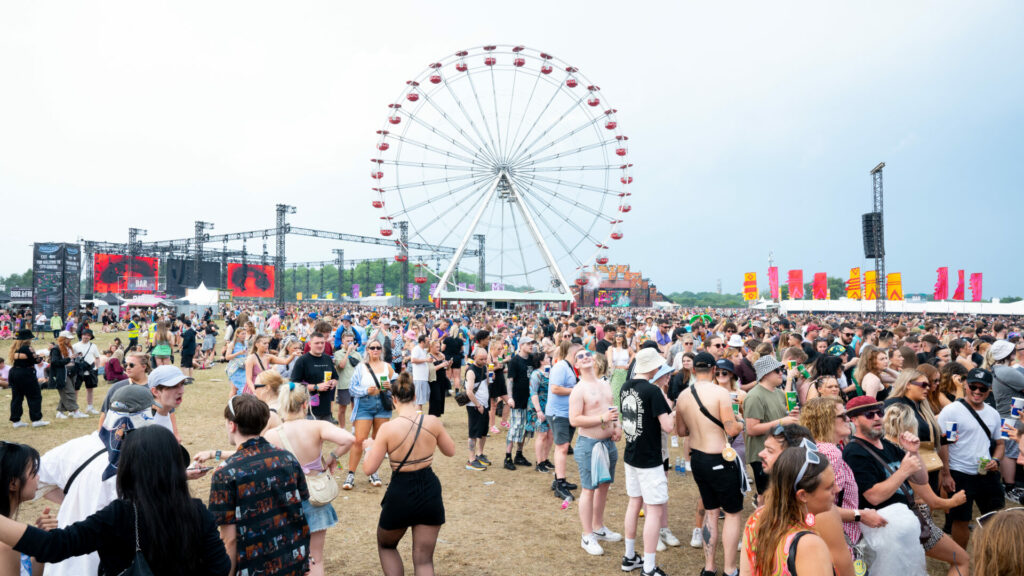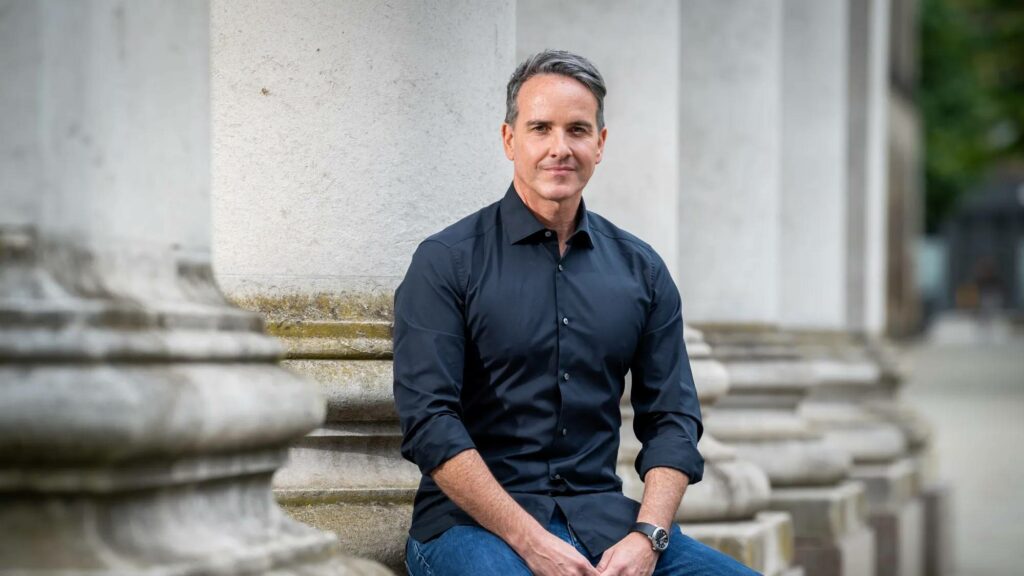Tales From The Dancefloor: An exclusive extract from the memoirs of Sacha Lord
Sacha Lord is the man who transformed Manchester's nightlife with The Warehouse Project, founded Parklife Festival and fought for the city's hospitality sector throughout Covid. In this exclusive intro from his new memoir, Sacha looks back at the start.
By Sacha Lord

‘Right, fuckin’ listen up … here’s what’s happening … we’re going to give you this bag with 20,000 pounds in cash, and you’re gonna put on a big night at the Academy for New Year’s Eve. Fifteen-hundred tickets, we’ll do the door and we’ll split the cash fifty-fifty, and you better not fuck it up!’
The guy talking was one of Salford’s biggest gangsters. Not someone to be messed with. I was twenty-three, scrawny, and so far out of my depth that I was drowning. I’d not long been promoting student nights and was living in a tiny bedsit, always having my phone cut off because I didn’t have twenty pounds to pay the bill. They had bundled me into the back of a car and driven me round town to make me an offer I couldn’t refuse, and I didn’t understand, either. Why me? I couldn’t do this.
“But who will we get to DJ?”
“You. You can DJ all night, then we don’t have to pay anyone, and make more money.”
“Me? ‘I can’t DJ!”
‘The fuck you on about? ‘You’re Sasha, aren’t you?!’ You played The Haçienda last month and it sold out!’
I saw a glimmer of light. A possible escape route out of an impossible situation.
“No, I’m not that Sasha. I’m not Sasha the DJ, I’m just Sacha, a shitty student promoter. You’ve got the wrong guy, sorry …”
“Fuck’s sake …”
The car pulled over, and I was thrown out on to the pavement …
Like most Mancunians my age, my life is a tale of two cities. Then and now. It has been the best of times, and the worst of times, often in the same week, sometimes the same night. It was a time of euphoric highs and crushing lows. The light and the shade. You don’t get a town like this for nothing. Manchester really has been the making of me, and it has so much to answer for the person who I am today.
I’ve been shot at in a drive-by shooting, bundled into a car by gangsters and had death threats, which was not very acid house. I’ve been sued and broke, I’ve had to deal with an army of rats who were high on cocaine, had £130,000 stolen from me during an armed robbery, and have been targeted by a Romanian organised crime gang. Not Balearic, as we say in Manchester.
But I’ve also been lucky enough to have had some of the most incredible, life-affirming experiences, and to be in the eye of the storm of a musical and cultural revolution. I’ve gone on to meet many of my musical heroes and have thrown some of the biggest parties that the UK has even seen.
Over the past thirty years, my generation witnessed a musical revolution, as electronic music went from being a niche, underground music genre to arguably the biggest one in the world.
Along the way, I went from a chain-smoking student living hand to mouth, always in danger of having my phone cut off, a visit from the bailiffs or threatened by a gang, to running the biggest nightclub in the world, and the largest metropolitan festival in the country.
We’ve had some terrible incidents, including tragic deaths at The Warehouse Project and Parklife, which is something you never really get over. No one should go for a night out and not come home again.
I am telling many of the stories in these pages for the very first time.
The Manchester I grew up in is very different to the city it is today. I think some people believe that the reinvention of Manchester started in 1996, after the Manchester bomb planted by the IRA, but the cultural revolution that started with acid house was already well underway before that event.
Manchester has always been a pop-culture city and the revolution of the city is absolutely rooted in that. It’s a fundamental part of what makes this the most invigorating and essential place to live: Manchester is the engine room of British music. Even back in the nineteenth century, German immigrants in the city complained that the locals preferred to sing popular contemporary songs rather than listen to the purities of classical music. Manchester is always looking forward. London may have most of the business, but it’s Manchester that, more than any other city in the UK, defines the musical direction of this country. I don’t think we would have been able to throw the parties and raves in disused breweries, air-raid shelters, and train stations in any other city. The Warehouse Project in particular is inherently Mancunian. It could only happen here.

This is also a city where you can reinvent yourself. You can be who you want to be in Manchester. This is the city where Morrissey met Marr, Jack met Vera, and Bobby met George and Denis. It’s where Engels met Marx, and Rolls met Royce. It’s a place where you can make things happen. It’s a fascinating, inventive, groundbreaking city that is always moving and makes you feel part of that movement, not a bystander. It’s a true city of the people, an egalitarian city, not one based on old money. There’s a very little ‘old money’ in Manchester. This was the world’s first industrial modern city, and the world’s first post-industrial city. In the words of Tony Walsh’s poem ‘This is the Place’: “This is the place to do business then dance, where go-getters and go-setters know they have a chance“. That’s always been the case, ever since the industrial revolution. Back in 1912, Sir Edward Abbot Parry wrote: “Manchester is the place where people do things … “Don’t talk about what you are going to do, do it.’’ That is the Manchester habit. And in the past through the manifestation of this quality the word Manchester became a synonym for energy and freedom and the right to do and to think without shackles.”
The writer Anthony Burgess, admittedly biased having been born in the city’s Harpurhey district, recalled in his autobiography Little Wilson and Big God how, for a Mancunian, a visit to London before the Second World War “was an exercise in condescension. London was a day behind Manchester in the arts, in commercial cunning, in economic philosophy”. I’d still agree with that now.
I went from selling leather jackets on a market stall to promoting my very first student club nights. There’s that old saying, “You’ve got to see it, to be it”. Noel Gallagher says when he first heard ‘Sally Cinnamon’ by The Stone Roses, it was a real lightbulb moment. He just knew straight away: “I can do that. I can write songs like that.’ When I first started going to nightclubs I thought, “I can do this. I can’t DJ or be the singer in the band on stage, but I know I can put the actual night on. I can be a promoter.”
I was just a normal kid growing up. I wasn’t a tearaway. I’d never been in trouble or met anyone who was a member of a gang. The only gangsters I’d seen were in Goodfellas, so my first year putting on club nights in Manchester was a wake-up call. We’ll get to that later, but there were some hairy moments. This city was lawless for a long time in the 1990s.
A lot of people are driven on by their childhoods, or their relationship with their parents, and I guess that I am too. I had a difficult relationship with my dad, who a lot of the time made me feel I’d never amount to much, and I think subconsciously that has pushed me on, to prove him wrong. I also watched him make a bit of a mess of his life and I was determined the same thing wouldn’t happen to me.
I still get imposter syndrome, even though I’m not ashamed to say I’ve done all right for myself. From living in a grotty Salford bedsit, I now live in leafy South Manchester, and I get to hang out with iconic music heroes backstage. But there’s still a nagging part of me that says, You shouldn’t be here. You shouldn’t be running the biggest nightclub in the world, and one of the biggest festivals in the UK, and advising the Mayor of Greater Manchester … You should still be on the market stall flogging knock-off leather jackets!
This is not a memoir, it’s more my view of the rebirth of a city and a musical revolution over the past thirty years, and how I was lucky enough to be a part of that. Luck has played a huge part in shaping my story, although I’ve worked bloody hard as well. I think you need both of those to achieve anything. Some people work their bloody bollocks off all their life, but they don’t get dealt much luck. Some people get dealt amazing luck but perhaps only realise with hindsight and don’t put the effort in to make the most of it. I think I had two major slices of luck – the first one was to be born in Manchester, an incredible city to be who you want to be, where you can write your own story. The second was to be born when I was, to be around when the acid house explosion changed the face of nightlife for ever. Blessed was it in that dawn to be alive, but to be very young was heaven. Nostalgia can be a disease, and at The Warehouse Project and Parklife we’re always looking forward. We’re always building for the future, but we’re also absolutely aware we’re building on foundations that were laid down in that period. I’ve been lucky enough to work with some amazing people, who have helped me along the way, not least my business partners in The Warehouse Project and Parklife, Sam Kandel and Rich McGinnis, but also many others who, though less visible, are absolutely key to the success of The Warehouse Project and Parklife.
I’ve worked with Sam Kandel since 2000, when we first reopened Sankeys. Sam was the one who first came up with the name and concept of The Warehouse Project.
Now felt like the right time to tell these stories for the first time. It’s been thirty years since I put on my first night at The Haçienda, and twenty years since I persuaded Manchester City Council to let us hold the first Warehouse party in the country after the Criminal Justice Bill, which sowed the seed for The Warehouse Project. I think we’ve done a good job over the years of talking about what happens on stage at our events, but I’ve never really talked about what happens backstage before.
More than anything, this book is a love letter to Manchester, and to the dancefloor.
Sacha Lord’s Tales From The Dancefloor is released on April 11.
